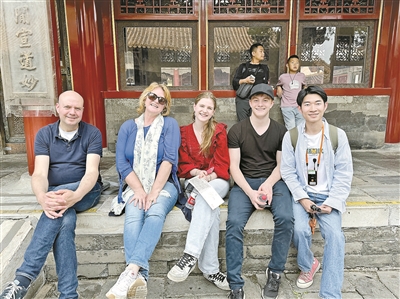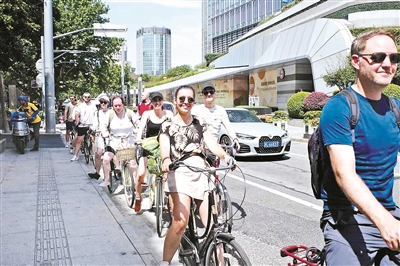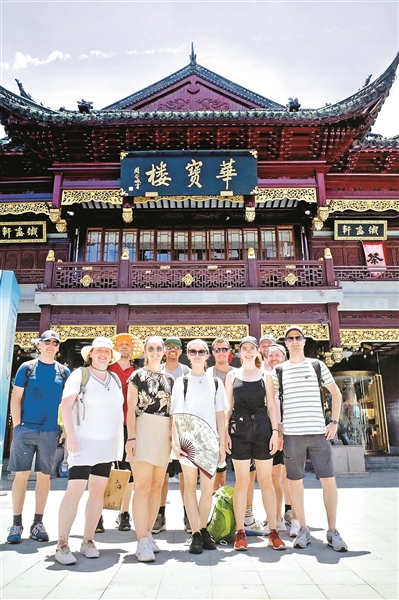Local foreign language tour guides witness increasing popularity of 'China Travel' among foreign tourists
Local foreign language tour guides across China are experiencing firsthand a "China Travel" boom spurred by the country's 144-hour visa-free transit policy, along with the continuous optimization of entry and exit policies.
Since its inception in January 2023, the 144-hour visa-free transit policy has been frequently expanded. So far, citizens from 54 countries are exempted from visa requirements during transit for 72 or 144 hours when heading for a third nation.
They are allowed to engage in short-term activities such as travel and business visits during the visa-free stay, which has led to a dramatic increase in the number of foreign tourists across the country.
Beijing's Forbidden City impresses
"I've seen a lot more foreign visitors in the Forbidden City this year," said a licensed Beijing tour guide named Zhang Jian.

A Beijing tour guide named Zhang Jian (first from right) and Dutch tourists pose for a group photo. (epaper.ynet.com/courtesy of the interviewee)
In recent months, Zhang, who has been obtaining orders for tour guide services via "We media" platforms, which are platforms where non-professional content creators can share content, has received more than twice the number of online orders from foreign tourists compared to the same period last year.
According to Zhang, since May this year, which coincided with the peak of the European holiday season and was followed by the summer vacation tourism boom, there has been a surge in the number of foreign tourists visiting China.
In the past few months, he has been receiving inquiries and orders from one or two foreign tourists every day, Zhang said.
Zhang has received tourists from many countries, with the highest number coming from the U.S., followed by the UK. Since May, the majority of his customers have been from the Netherlands, Zhang said.
A major part of Zhang's job is taking tourists to well-known tourist attractions within Beijing, and the Palace Museum, also known as the Forbidden City, is the place he frequents the most.
As a must-visit for foreign tourists, the Forbidden City never fails to impress foreign visitors, according to Zhang.
Every foreign tourist visiting the Forbidden City for the first time is surprised by the royal wooden-style buildings with golden roofs and red walls, Zhang said. They say the buildings here are "much more different", he quoted.
During their journey, many foreign tourists have experienced the friendliness of the Chinese people, according to Zhang, who said Chinese people actively greet foreign tourists and talk with them in English, and when foreign tourists see Chinese people in traditional costumes taking photos in the Forbidden City, they approach them and take pictures together.
Experience convenient shared bikes, e-payment in Shanghai
Liu Lichao, a tour guide in east China's Shanghai Municipality, has also witnessed a significant increase in the number of foreign tourists.
Liu has been working as an English tour guide for six years since graduating from Shanghai University of International Business and Economics. Currently, Liu mainly receives tour guide bookings through online platforms.
According to Liu, he now leads seven to eight foreign tourist groups every week. On weekends, he often serves one group in the morning and another in the afternoon. The majority of his customers are Europeans, mainly from the Netherlands and Germany.

Foreign tourists ride bicycles in China. (epaper.ynet.com/courtesy of the interviewee)
Compared to the previous years when he obtained orders through a foreign travel company, not only has the number of foreign tour groups increased, but the size of the groups has also grown, Liu said.
A tourist group typically consists of at least 20 people, and sometimes even more, requiring two tour guides to lead them, he explained.
Shared bikes dotting every corner of Shanghai is one of the most surprising scenes for foreign tourists, according to Liu, who said cycling is one of the highlights of foreign tourists' tour of the city.
As foreign tourists ride shared bicycles around Shanghai and notice the constant presence of food delivery riders and couriers on the road, they are amazed by the convenience the Chinese people can enjoy, Liu said.
The convenience of electronic payments in China also surprises foreign tourists, according to Liu. Simple things that Chinese people take for granted like using electronic payment services for buying a beverage, an ice cream, or a scallion pancake are considered "incredible" to foreign tourists.
Many foreign tourists are also surprised by how safe it is to live in China, according to Liu, who recalled that his foreign customers were astonished as they saw him simply leave a shared bike outside a lane in Shanghai without locking it.
There was another incident that impressed foreign tourists regarding China's safety, Liu said. A French mother and her son in Liu's tourist group took a car back to their hotel using China's online ride-hailing service, but the mother accidentally left her phone in the car, causing her to become extremely anxious.
Liu told her that it should be possible to retrieve the phone by contacting the driver through the platform on which she ordered the service, but the mother couldn't believe it.
After 20 minutes, the driver returned the phone to the hotel where the mother and son were staying. The French woman handed him 100 yuan ($14.09) as a token of gratitude, but the driver only accepted 30 yuan for the fuel cost.
According to Liu, the mother later shared this experience on her social media account after returning to her home country, showing her fellow countrymen that China is a safe country, and that safety is enjoyed by every individual in the country, regardless of their origin, skin color, or social status.
Fresh impression: A country of historical charm and modern convenience
By greatly facilitating foreigners' visits to China, the 144-hour visa-free transit policy has allowed more foreign tourists to get a better understanding of the splendid history of ancient China and to personally experience the country's technology-empowered modern convenience, subtly breaking down some of the stereotypes foreigners have about China.
A Dutch tourist once told Zhang that it was not until he took a flight to Shanghai that he was surprised to find there are subways in Chinese cities, cities are connected by high-speed trains, and everyone travels using modern transportation instead of horse-drawn carriages and sedan chairs.

Foreign tourists pose for a group photo during their travel in China. (epaper.ynet.com/courtesy of the interviewee)
A British tourist named Jimmy who had been to China during the Beijing 2008 Olympic Games told Zhang that before coming to China, his biggest concern was how to communicate with the Chinese people, because he thought that most Chinese people would be afraid to interact with foreigners.
However, after arriving in Beijing, he was immediately touched by the warmth of the Chinese people, Jimmy told Zhang, noting that Beijing's taxi drivers would enthusiastically introduce him to the city's attractions and culture.
According to Zhang, Jimmy came to Shanghai this time with a friend through the 144-hour visa-free transit policy. He found that compared to the year 2008, China has undergone many new changes, while the freedom of life has remained unchanged.
More ports added
China's National Immigration Administration announced on July 15 that the 144-hour visa-free transit policy has been expanded to three more entry ports, namely Zhengzhou Xinzheng International Airport in central China's Henan Province, Lijiang Sanyi International Airport in southwest China's Yunnan Province, and the Mohan railway port in Yunnan.
The statement has taken the number of ports covered by the 144-hour visa-free transit policy to 37, better facilitating foreigners' visit to more regions across China.
Since the implementation of the policy, many foreign tourists have shared their experience of traveling in China, making "China Travel" a buzzword on overseas social media platforms.
"Many travel bloggers in our country say that once they go to China, they don't want to come back," said an Indian tourist.
A Spanish tourist said, "It's fun and not too expensive. Once you go to China, you don't want to leave."
An American tourist who visited Beijing said 144 hours is simply not enough, because there are too many historical sites and cultural attractions in the city, and it would take 144 days to fully explore the city.
As a Chinese bilingual tour guide, Liu believes that the 144-hour visa-free transit policy has injected strong impetus into the inbound tourism of the country, providing more job opportunities for tour guides like him while stimulating the economy.
Liu also believes that the policy has significant implications for enhancing China's international image.
"Through the extensive people-to-people exchanges in the tourism industry and the influence of short videos on social media, every ordinary foreigner can voice their opinions and share their most authentic feelings and perspectives about China based on their own experiences," he explained.
Photos
Copyright © 2024 People's Daily Online. All Rights Reserved.









